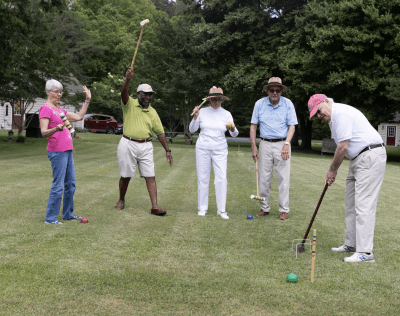
RWC holds brain health seminars and events like this one held June 16.
Human cognitive abilities typically reach their peak around age 30. Some of our thinking processes slowly begin to deteriorate afterward, and this is part of healthy aging in the brain. However, it is possible to prevent or delay some forms of cognitive decline, such as mild cognitive impairment and dementia, simply by leading an active, healthy lifestyle.
Maintaining good brain health requires a multi-pronged approach along both physical and intellectual lines. Here’s how you can stay cognitively fit for longer by taking care of your body and brain.
Physical Health Is Key to Brain Health
Many Americans don’t realize how important physical health is to mental health. Here are some ways to keep both in excellent shape:
- Stay physically active. Physical activity has proven benefits for the brain at every stage of life, and it doesn’t have to be a chore. Think of forms of exercise you already enjoy, such as gardening, hiking, or playing golf or croquet. Going for daily walks is a great place to start. In addition to strengthening your body and making it resilient, staying physically active is great for managing anxiety and depression, getting high-quality sleep, and maintaining your capacity for learning and memory.
- Eat healthy foods. Did you know that eating a balanced, nutritious diet can slow your brain’s aging process by up to 7.5 years and reduce your chances of developing Alzheimer’s disease? Researchers have discovered that the best foods for brain health include greens and vegetables, berries, nuts, olive oil, fish, and moderate amounts of alcohol. Eating less meat and more legumes also helps to prevent cognitive decline.
- Maintain healthy behaviors and medical checkups. Becoming a senior doesn’t mean you’ve graduated from the need for a generally healthy lifestyle. It’s more essential than ever to get regular medical checkups and screenings and manage existing health problems. Talk to your doctor about whether your current medications will impact your cognitive ability. Avoid smoking or excessive alcohol use, reduce your risk for falls, and make sure you’re getting high-quality sleep.
Ways To Keep Your Brain Active and Healthy

Staying physically and socially active helps improve brain health.
We know that a sedentary lifestyle is bad for the body, but it’s just as important to keep your brain moving. Here’s how you can stay mentally fit:
- Participate in group activities. Staying socially active is an important part of overall brain health, and it can even prevent depression and dementia. Schedule a family gathering or simple activity with loved ones. Call a friend to catch up, look for volunteer opportunities, join a book club, or participate in a community event. If faith is important to you, consider getting more involved with your local church.
- Stay engaged with your hobbies or choose new ones. The golden years of retirement are full of opportunities not only for enjoyment, but good brain health. During this time, you can get back into hobbiesyou didn’t have time for when you were working, or even try out new ones. Doing fun leisure activities that require a degree of skill not only keep your brain engaged and functioning well, but offer great conversation topics and ways to meet new people.
- Keep a daily routine. Maintaining a healthy routine will both give you a sense of comfort and structure and help you get the most out of every day. In addition, it will help you decide what your daily priorities are and make changes that better suit your health, lifestyle, and personality. Of course, changing things up once in a while helps to keep things from getting too routine: fresh experiences are also good for the brain.
- Manage stress. Most people don’t think of stress as something that impairs cognitive function, but in the long term, uncontrolled stress levels can change the structure of your brain in ways that diminish memory. You can minimize stress by focusing on what you can control, getting high-quality sleep, exercising, staying organized, and developing healthy responses to stress. Don’t forget to reach out for help when you need it so that you don’t get overwhelmed.
- Learn something new. One of the best ways to stay mentally sharp is to never stop learning new things. Studies show that the greatest improvements in cognitive ability are gained from learning difficult things that place more demands on the brain. This means that retirement may be the perfect time to pick up new digital skills, a new instrument, or a challenging project. Learning helps to strengthen connections between different parts of your brain as well, and can help to ward off cognitive aging.
Enjoy Good Brain Health at Rappahannock Westminster-Canterbury
Rappahannock Westminster-Canterbury is a continuing care community (also known as a life plan community) providing the highest quality living experience for discerning senior adults. Situated on 165 beautiful acres outside the village of Irvington in Virginia’s Northern Neck, RWC residents choose to live here for the independent and worry-free lifestyle afforded in a tranquil setting.
Our spacious Westlake Apartments on Wood Duck Lake offer plenty of amenities as well as opportunities to socialize and make new friends. Our homes and facilities are designed to offer maximum safety and comfort.
Rappahannock Westminster-Canterbury Inc. is a Virginia nonprofit corporation affiliated with the Episcopal and Presbyterian churches. All religions are welcome. Read about our residence options and living our lifestyle!
